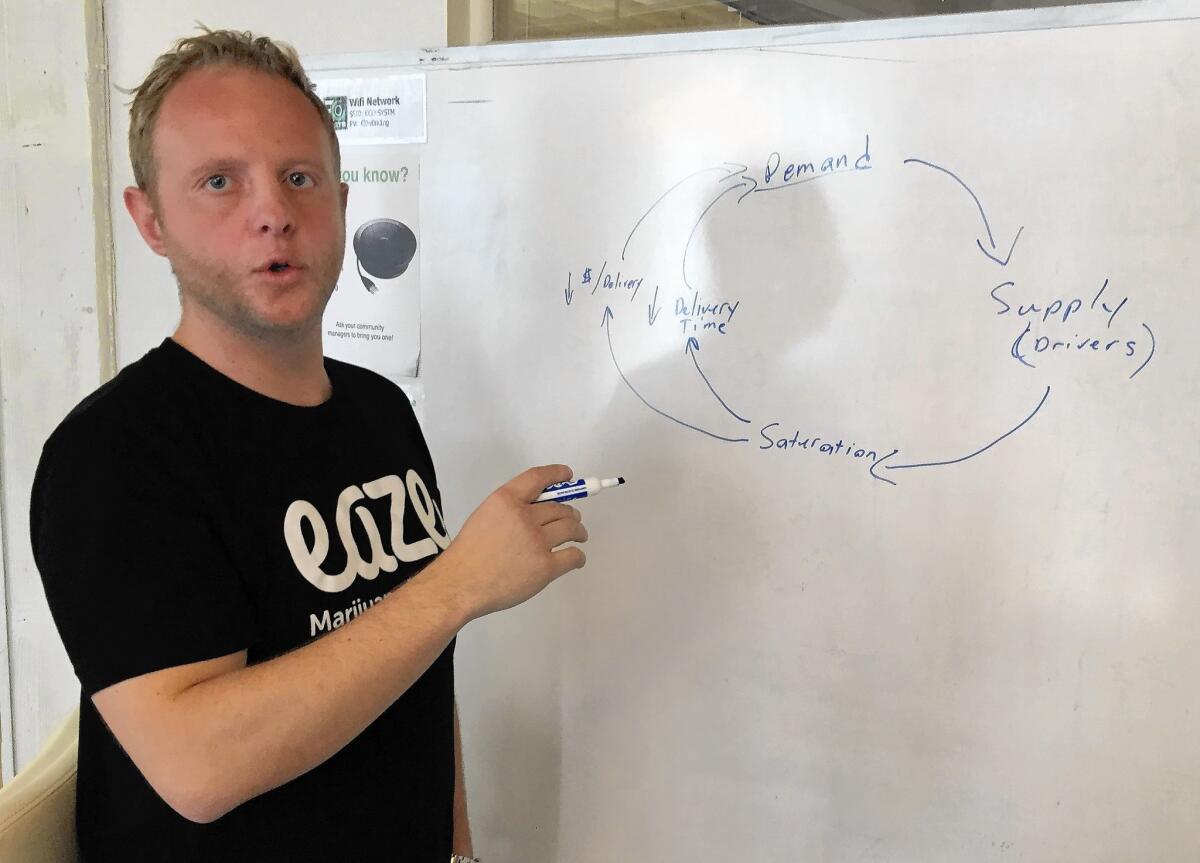Quicker than pizza delivery: Medical marijuana service aims to satisfy

reporting from SAN FRANCISCO — Carlos and I are bombing around San Francisco in his 1999 Maxima, delivering marijuana to people who have ordered it from Eaze, a company that many have called the “Uber of cannabis.” I had forgotten how fast 25-year-old guys like to drive.
But this is good, because Eaze boldly promises customers, all of whom must have medical marijuana cards, that they will receive their weed in 15 minutes or less.
Our first delivery of the afternoon, about $200 worth of sweet-looking bud, goes to a woman who lives in the Mission. She comes out to the sidewalk to meet us. She looks as if she’s in her early 30s, is in the retail wine business, and does not want to give her name.
Eaze marketing head Jamie Feaster, 28, who is along for the ride, asks her how she likes Eaze. Any suggestions to make it better? Nope, she says. She loves Eaze. “In college,” she says, “we wished for this.” She hands Carlos a wad of cash, and tosses in a $5 tip.
Our second delivery is across town, in South San Francisco. A woman who looks to be in her late 20s is standing in front of her apartment building waiting for us. Today was her day off, she says, and she’s already gotten a head start on relaxing, if you catch her drift. She buys an eighth of an ounce of OG True, for $40, and throws in a $2 tip for Carlos.
Our final stop for the afternoon is a row house in the Bay View neighborhood. A middle-aged man has ordered a quarter-ounce of Chiquita Banana, a.k.a. Banana Crush, for $95. Carlos takes it to his door. Another wad of cash, another $5 tip.
“A friend told me about this,” said Carlos, who has worked as a pharmacy technician. “I thought it was futuristic.”
Indeed.
::
Eaze, which launched 16 months ago, is the brainchild of Keith McCarty, a wonky 30-year-old who did not hesitate to leap out of his chair in his office and draw on a whiteboard to explain things. The company is working out of a tech incubator downtown and will soon be moving its 43 employees to more permanent quarters.
McCarty, who grew up in Orange and graduated from Chapman University in 2007, was a founding member of Yammer, a sort of Facebook for companies. In 2012, Microsoft bought Yammer for $1.2 billion. (Yes, I know; McCarty has had two lucrative ideas. You and I have had none.)
Eaze is strictly a technology and logistics company. It has business arrangements with dispensaries, which hire the drivers. Eaze provides the cannabis menu, but does not handle the product. McCarty won’t say how many deliveries Eaze processes, only that it makes thousands of deliveries a day and is the biggest in its field. The company serves the Bay Area, Santa Cruz, the Westside of Los Angeles, Orange County and San Diego.
Many users love it, though some reviews are savage. Long delivery times, rude drivers and other mix-ups arouse the ire of the pot-deprived. Sometimes people become frustrated because they must open a Web browser for Eaze, instead of an app. (Apple does not allow apps for pot sales.) Sometimes a message on the site says “Eaze is asleep” and customers should come back later.
Last summer, David Downs, a San Francisco-based author and columnist for the East Bay Express who writes about cannabis, tried out Eaze’s then-promise to deliver in 10 minutes. It took twice that long, wrote Downs (who is married to my niece), but he was still impressed: “That’s still way faster than you can get a pizza in the Bay.”
Still, near-instant gratification remains the sine qua non of this venture. “When our data shows delivery times exceed 28 minutes, we start to see a drop-off in business,” McCarty said. “We are starting to create an ‘I want it and I want it now’ economy.”
Recently, Eaze added a feature that is available as an app: Eaze MD. It’s a convenient way to obtain a medical marijuana card. The headline on the tech site Re/code was right to the point: “Get a doctor’s note to get stoned without leaving home. Legally.”
With the prospect of legalized recreational marijuana looming in California, businesses nervous about cannabis are coming around. Eaze raised $12.5 million from venture capitalists, including a chunk from Snoop Dogg, who is probably California’s most famous stoner.
McCarty thinks this business model could be expanded to include all kinds of medicine. “Today it’s cannabis, tomorrow it could be Viagra,” he says, smiling.
::
Carlos asked me not to use his last name. He does not want anyone to know what he does for work. It’s safer that way. He carries a trunkful of cannabis product: buds, joints, cannabis-infused candy, oils, cookies and some things I don’t even recognize.
At the start of each shift, he picks the cases up from a dispensary in San Jose and drops them back off at the end of the night. He said he earns between $16 and $30 an hour and his tips are usually enough to cover gas money.
He waits, like an Uber driver, until his cellphone pings with an order. He usually stops a couple of blocks from the customer’s home to grab the product from his trunk and bag it. It’s more discreet that way.
Most of his customers are women, he told me. “I once delivered to a girl on a sailboat.”
The boat was docked, by the way. All in a daze work.
Twitter: @AbcarianLAT
More to Read
Sign up for Essential California
The most important California stories and recommendations in your inbox every morning.
You may occasionally receive promotional content from the Los Angeles Times.











